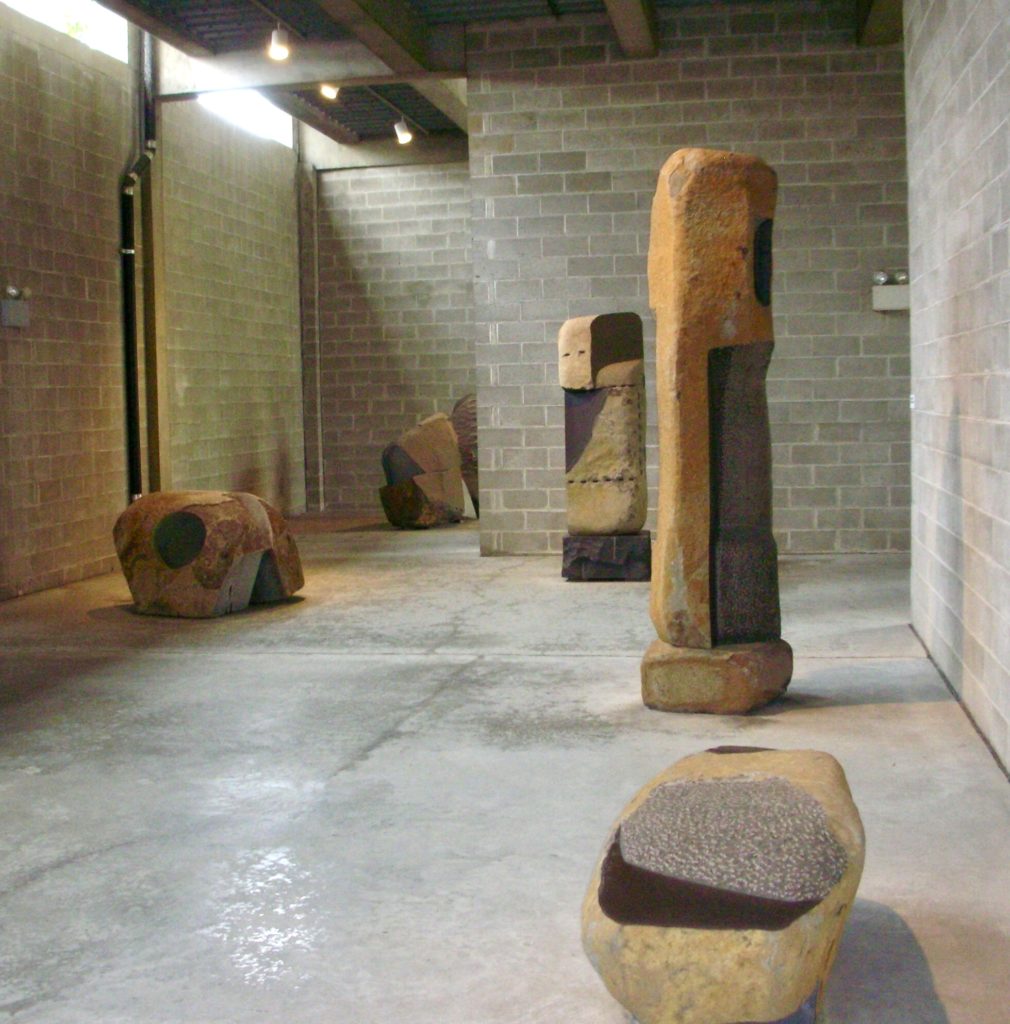Isamu Noguchi (1904-1988) was an acclaimed international sculptor, designer, and landscape architect. A Japanese American, Noguchi was born in Los Angeles but raised in Japan and studied pre-medicine at Columbia University, New York. In 1942, he founded Nisei Writers and Artists Mobilization for Democracy, and voluntarily entered a U.S. internment camp in Arizona during World War II.

Photo by Russell C. Leong
i
stones are the affection of old men, you say
their immanence leaves no room for error
every chisel leaves an indelible notch
pure scar, in granite groove emanating
ii
sea stone
oyster shells leave their imprint on the holocene
wind whistling down the aeons of displacement
you say you hear the stones sing
their voices ringing a stoning silence slenderly
a stony sea makes itself felt
through your hands of basalt and marble
a voiced shape emerges, seeing stone
sea stone
iii
every stone in your museum
is precisely placed by you
a clarity of tactility
where each heft must cleft the earth
where each step may pass your touch
precarity of balance
tenuous, exacting
what torment you must have endured
in the confusion of your belonging
an american, forever untethered
iv
the elegance of your despair
the core dug out of the depths of stone, gaping hole of betrayal
holds us in remembrance, in attenuated horror
a country that turned on you, passionate stonecutter
cleaver of mountain dreams
penitence made intransigent, heavy
weighed to the ground of accountability
v
i am here, because of your stage set for frontier
space carved out of rope
floating wood, nymphic cotton
framing that unforgettable extension of torso and hamstring
a humanly impossible reach for the sky that only martha graham could conjure
pure line and gesture
halting time in breathless wonder
mortality against light, body against void
bone gave form a sound through your material machinations
a new ephemerality arose
bare minimalism exposed all its dangerous beauty in 1935
before hell threw open its molten doors
unimaginable horrors, impending pandemonium
seen through the wooden slats of a bare boned internment camp
in the desolate Arizona desert
a harsh brutal aesthetic pushes forth as granite, rock and stone
vi
forgotten, your remembrance drags us back to the present
the warm chronicles of inhabiting earth in all its mortality
wounded in its undying promise of belonging
i walk amidst your markers of knowing, plinth by plinth
smooth dark burnished stone glistening pockmarked history
vii
warm stones wrap around the green glade of possibility
warped weathered wired heft
reminiscent of desert griefs unknown to most
the terror of being the scapegoat of history
noguchi’s giant testaments
smooth, flawless, cool to the touch
white, sandstone yellow, a quiet mourning of a lost century
for a people too proud to speak, too fearful to sleep
forgotten, you remain the underbelly of our present
viii
a spiral slide of sculpture
a chance for people to slide slide slide
a spiral chance for sculpture that slides
so people may have a chance in spiral slides
noguchi slides that spiral as chance sculptures
ix
you make a sculptural duo of light and stone
raw flesh of granite exposed in the los angeles light
a behemoth, asleep in its own shadow
as the standing other weathers barrenness of too much emptiness
a pain that blisters the national psyche, again
as frightened babies in caged camps shock a prayer to the issei
x
my neighbor says you had a way with women
always accessoried with a chiseled young thing
my neighbor says you were quite the party man
wild bohemian, pure stonecutter
my neighbor would not stop talking about you
arched eyebrows recalling palpable heidonism behind those austere forms
xi
i think of you too often these days, noguchi
as the morning paper sprawls with images of a new era of human incarceration
migrant children in cages
refugee children outside metal containers
undocumented children in gestures of hopelessness
we haven’t learned from our pasts
we haven’t learned from your past
we do not appear to recall a historic past
xii
metal wall in tijuana
long shadow creeps south
exhausted migrants in states of weariness recline in the foreground
an unfolding dread
of hapless refugees facing trumps militarization
exudes the pages
unrelenting political travesty
xiii
Covid-19 they call it
the contagion without borders
they would like to cordon it off into camps, like they did you
they would like to blame it on the asians, like they did you
but nature resists easy identification, easy mappings
of virus, contagion and immigrant longings
xiv
burning sand fills your eyes, noguchi
Poston, 1941
in the sweltering arizona desert
you dream an american city of democratic citizenship
even as the issei and nissei struggle to assimilate inside a world gone mad
forced evacuations into arid camps damn a generation of japanese americans
neither asian nor entirely american, believing in the power of american law
feverishly, you witness your community treated like a contagion
contained, quarantined1
Notes
[1] This cycle of fourteen poems embodies the period of quarantine people around the world have been practicing during the Covid-19 pandemic.
